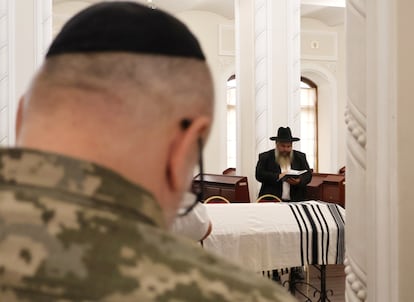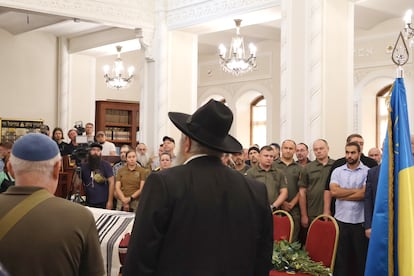Ukrainian Jewish community mourns the death of chief rabbi’s son in Donbas
The funeral commemorated Jewish soldiers killed in a war that Putin has launched to ‘denazify’ the country. The people at the ceremony agreed that if there is a fascist state, it is Russia

Kyiv — the capital of a state dominated by Nazi elites, in the words of Russian autocrat Vladimir Putin — said goodbye on Thursday to Matisyahu Anton Samborski, the son of Ukraine’s chief rabbi. Rabbi Moshe Azman held back tears as he lamented that Russia’s way of “denazifying Ukraine” is by killing Jews like his Anton. Samborski died fighting on the front in Pokrovsk, in Donbas province, currently under attack by Russia.
Samborski’s funeral in Kyiv’s Brodsky synagogue attracted dozens of journalists, as well as relatives who wanted to say their last goodbyes to the 33-year-old. It was an intimate ceremony compared to the large Orthodox funerals of Ukrainian fighters in Kyiv’s St. Michael’s Cathedral or Lviv’s Greek Catholic Church, run by military chaplains. But the symbolism of the event was greater because Ukrainian Jews — including Israel’s ambassador to Ukraine, Michael Brodsky, who sat in the front row — wanted to show Russia that not only is President Volodymyr Zelenskiy Jewish, so are the soldiers who are being killed defending their homeland.
Samborski’s death is a tale of wartime misery, one shared by thousands of other soldiers, whatever their faith. He was drafted in May, as Ukraine’s new law to mobilize more civilians came into effect. He received only one month of training, according to his father, and was fighting by July. On July 24, he went missing in action, and it was only recently that his body was recovered. Samborski’s first daughter was born a week before he was drafted.

The funeral was attended by soldiers from various brigades, including the Azov Brigade, a regiment with far-right roots that is often used in the Russian propaganda accusing Ukraine of being a neo-Nazi dictatorship. Olena Tolkacheva, a representative of the Azov Brigade foundation in support of fighters, explained that she had come because of the regiment’s appreciation for Rabbi Azman and his efforts to evacuate civilians and Azov soldiers who were besieged in the battle of Mariupol.
The military personnel present at the funeral did not want to reveal which brigade Samborski had served, although Tolkacheva confirmed that it was not the Azov Brigade. Nor did the chief rabbi’s team know how many Jews are fighting in the Ukrainian Armed Forces, or how many have died for their country. A captain of the 108th Brigade of the Territorial Defense Forces only told EL PAÍS that “there are many Jews in the army, as well as many Jews who have died.”
The World Jewish Congress estimates that in 2023 about 45,000 Jews were living in Ukraine — 2% of the total population. A decade earlier, there were 71,500. Many have taken refuge abroad or live on the aid that the central synagogue in Kyiv distributes every day.
Ukraine was, along with Poland, the country in which Nazi Germany killed the most Jews during World War II. Boris Zabarko, chairman of the Ukrainian Association of Jews and Former Prisoners of Ghetto and Nazi Concentration Camps, spoke at Samborski’s funeral. Zabarko is 89 years old and was interned in a ghetto in Vinnytsia province during World War II. Zabarko stressed in his speech that, unlike then, “when the Jews were abandoned to God, today they have the support of great alliances both in Ukraine and in Israel.”
Israel and Russia
In perfect German, learned during his years as a scientist in the former East Germany, Zabarko says that Ukrainian society overwhelmingly supports Israel in the war against Hamas and Hezbollah. This opinion is consistent with the many public statements and comments made by Ukrainian citizens since the start of the Israeli invasion of Gaza in 2023. Ukraine’s support for Israel, however, contrasts with the Israeli government’s conciliatory attitude towards Putin: Israel has neither supported Western sanctions against Russia nor delivered a single weapon to Ukraine. Bilateral relations between Israeli President Benjamin Netanyahu and Zelenskiy have been strained, with diplomatic conflicts and threats between embassies.
“Israel may not give us weapons, but it does help us, with medicines and humanitarian supplies,” Zabarko replied. He and other Ukrainian Jews interviewed declined to criticize the Israeli authorities for its lack of commitment to Ukraine. The central message of the speeches during the funeral service was to make clear that if there is any fascist state, it is Russia.
“Have you seen Nazis in Ukraine? I haven’t,” Holocaust survivor and Zabarko’s friend, Roman Shvartsman, asked EL PAÍS in April 2022 during an interview in Odessa. While no response was given, this newspaper could have replied in the affirmative, but they are a minority group, just like in other European countries. For example, in the summer of 2022, in a performance hall located on the same corner as Kyiv’s Brodsky synagogue, a concert was being held in tribute to the late Taras Bobanych, the commander of the military branch of the far-right political group Right Sector. At the tribute, a few veterans of the movement wore SS emblems and swastikas. To immortalize the moment, a dozen of them went out into the street, and were photographed doing the fascist salute.
Sign up for our weekly newsletter to get more English-language news coverage from EL PAÍS USA Edition
Tu suscripción se está usando en otro dispositivo
¿Quieres añadir otro usuario a tu suscripción?
Si continúas leyendo en este dispositivo, no se podrá leer en el otro.
FlechaTu suscripción se está usando en otro dispositivo y solo puedes acceder a EL PAÍS desde un dispositivo a la vez.
Si quieres compartir tu cuenta, cambia tu suscripción a la modalidad Premium, así podrás añadir otro usuario. Cada uno accederá con su propia cuenta de email, lo que os permitirá personalizar vuestra experiencia en EL PAÍS.
¿Tienes una suscripción de empresa? Accede aquí para contratar más cuentas.
En el caso de no saber quién está usando tu cuenta, te recomendamos cambiar tu contraseña aquí.
Si decides continuar compartiendo tu cuenta, este mensaje se mostrará en tu dispositivo y en el de la otra persona que está usando tu cuenta de forma indefinida, afectando a tu experiencia de lectura. Puedes consultar aquí los términos y condiciones de la suscripción digital.









































